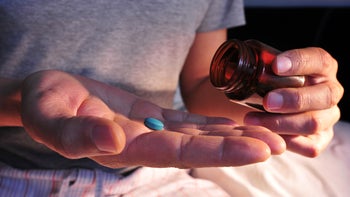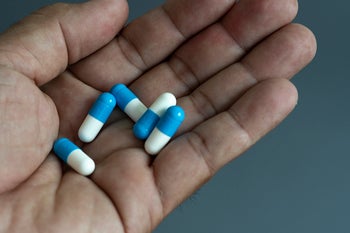
Erectile Dysfunction (ED) Symptoms: How to Recognize the Signs
Key takeaways:
Erectile dysfunction (ED) is a common problem and becomes more common with age. The main ED symptom is a regular difficulty getting and keeping an erection.
ED has many causes and can sometimes be a sign of other health problems.
If you have ED symptoms, talk with a healthcare professional about your treatment options.
Access savings on related medications
Table of contents
Erections are an important part of physical and mental health. Blood vessels, nerves, hormones, and psychological factors all contribute to having healthy erections. When there’s a problem in any of those areas, it can lead to erectile dysfunction (ED).
ED used to be called impotence, but the term was changed to better describe the condition. Basically, these terms mean the same thing. ED is when you have a regular inability to have and maintain an erection. This becomes more common as people age. But it can also happen due to health conditions or medications. ED symptoms can vary from person to person, and it can sometimes be confused with other sexual health problems.
Let’s take a closer look at ED symptoms and what you can do about it.
What are the most common symptoms of erectile dysfunction?
The symptoms of ED mainly center on the quality of an erection.
ED is common and affects more than 30 million men in the U.S. But men are often reluctant to visit a healthcare professional once symptoms start. The symptoms of ED are usually around for about 6 months before someone seeks medical help.
Below we’ll take a closer look at common ED symptoms. It’s normal to occasionally have some of these issues. But, if these symptoms happen more than half the time, then you may want to talk with a healthcare professional about ED.
Do you think you have erectile dysfunction (ED)? Don’t start taking Viagra without seeing a healthcare professional. Here’s why.
Alcohol can worsen ED symptoms. But did you know that some non-alcoholic beverages may help? Here’s a list of drinks that may make ED better.
Your ED may not be lifelong, depending on the cause. Here are some common curable causes of ED and how they’re treated.
Difficulty getting an erection
Under normal circumstances, sexual arousal is followed by achieving an erection. Erections are a result of blood vessels dilating and allowing blood into the penis. At the same time, blood flow out of the penis through veins is reduced. This traps the blood, making the penis hard.
An erection takes coordination between:
The central nervous system
Spinal cord
Peripheral nerves
Hormones
Cardiovascular system
Plus, there’s a psychological aspect. A problem in any one of these areas can make it difficult to achieve an erection.
Difficulty maintaining an erection long enough for sexual intimacy
When an erection goes away before you’re ready, it can be frustrating and embarrassing. The complex interplay between hormones, nerves, and the cardiovascular system can impact how well you maintain an erection.
Having erections that aren’t hard enough for penetration
Penetration occurs when the penis is inserted into a bodily orifice (opening). An erection has to be hard enough to push past the tissues surrounding the opening for penetration to occur. Sometimes an erection can occur but not be hard enough to achieve penetration.
Loss of erection after penetration
Loss of erection can happen at any point in a sexual encounter. Loss of an erection after penetration is similar to not being able to maintain one long enough to initiate sexual intercourse. But, in this case, it happens later in sexual intimacy.
Unsatisfactory intercourse
The definition of erectile dysfunction is based on your ability to have satisfactory intercourse. If you’re having intercourse, but don’t find it satisfying, you may be experiencing ED. Even if you don’t have any other symptoms, it’s worth talking to a healthcare professional.
Can ED happen suddenly?
No, ED doesn’t usually happen suddenly. Having said that, it’s normal to have sudden, unexpected difficulty with erections from time to time. This may happen especially when you’re:
Under stress
Having relationship difficulties
But, when symptoms start to happen regularly over a period of several months, then it may be a sign of ED.
ED symptoms that happen because of underlying medical conditions usually take months or years to develop. This is due to changes in your hormones, blood vessels, and nerve health. As you get older, difficulty getting and keeping an erection will likely happen more often as a result.
Quiz: Is it erectile dysfunction?
What causes erectile dysfunction?
Many health conditions can cause erectile dysfunction. So, it’s important to have these conditions treated. Sometimes erectile dysfunction symptoms can be the first warning sign of health issues you didn’t know you had. Some of the main reasons for erectile dysfunction include:
Health conditions: This includes hormonal, cardiovascular, or neurological issues.
Lifestyle factors: This includes drinking alcohol, smoking, or using recreational drugs.
Certain medications: This includes medications for high blood pressure, heart disease, or depression.
Mental health concerns: This includes depression, anxiety, and stress.
How do you know if it’s ED or something else?
ED can sometimes be confused with other sexual problems. Other common issues that can affect sexual satisfaction include:
Low libido (decreased interest in sex)
Premature ejaculation (when ejaculation happens too soon after penetration)
Delayed ejaculation (when ejaculation takes a long time after penetration)
Anorgasmia (unable to have an orgasm at all)
ED can sometimes happen at the same time as these other conditions. To get the right diagnosis and treatment, it’s important to talk with a healthcare professional about any libido changes, erection patterns, and ejaculation concerns.
When should you see a doctor for erectile dysfunction symptoms?
You should see a healthcare professional as soon as you have concerns about your sexual performance. The earlier a problem is caught, the easier it may be to treat. Earlier treatment also helps minimize frustration for you and your partner.
If your ED is due to an underlying medical condition or medication, a healthcare professional can make the diagnosis and treat those conditions. Substituting your medication for a different one, or simply changing the dose, may help improve ED symptoms.
Frequently asked questions
While ED can happen at any age, ED is more common in older men. Up to 35% of men have ED symptoms between the ages of 55 to 64, and symptoms increase with age. If a man lives long enough, he will likely experience ED.
If you have any of these symptoms on a regular basis, you may suspect ED:
Inability to have an erection
Your erection isn’t hard enough for sex
Your erection doesn’t last long enough
Your sexual intercourse is unsatisfactory
But finding the underlying cause is crucial for treating ED effectively.
To diagnose the cause of your symptoms, a healthcare professional may:
Perform blood tests
Perform radiology tests
Look at your medications
Ask you mental health questions
Treatment for ED may include lifestyle changes, medications, or psychotherapy. When underlying conditions — like diabetes or high blood pressure — are causing ED, it’s important to treat those. It’s also a good idea to review your medications with a healthcare professional to see if these could be causing ED as a side effect.
Psychotherapy can be helpful when there are underlying psychological conditions, such as anxiety or relationship challenges.
Oral medications to treat ED include PDE5 inhibitors that increase blood flow to the penis, such as:
Sildenafil (Viagra)
Tadalafil (Cialis)
Vardenafil (Levitra)
If ED medications aren’t good options for you because of your medical history, there are other treatments available. These include:
Injections
Suppositories
Penile pumps
The bottom line
ED is a common condition and can often overlap with other sexual problems or health conditions. ED symptoms include having recurrent difficulty with getting and keeping an erection. ED can be an early warning sign of other health conditions, like diabetes or heart disease. That’s why it’s important to talk with a healthcare professional about your sexual concerns.
Why trust our experts?



References
Abdel-Hamid, I. A., et al. (2017). Delayed ejaculation: Pathophysiology, diagnosis, and treatment. The World Journal of Men’s Health.
Dean, R. C., et al. (2005). Physiology of penile erection and pathophysiology of erectile dysfunction. Urologic Clinics of North America.
HardFacts.com.au. (n.d.). Understanding ED. Boston Scientific.
Jenkins, L. C., et al. (2015). Delayed orgasm and anorgasmia. Fertility and Sterility.
Leslie, S. W., et al. (2024). Erectile dysfunction. StatPearls.
Mark, K. P., et al. (2024). Erectile dysfunction prevalence in the United States: Report from the 2021 National Survey of Sexual Wellbeing. The Journal of Sexual Medicine.
National Institute of Diabetes and Digestive and Kidney Diseases. (2024). Definition and facts for erectile dysfunction. National Institutes of Health.
National Institute of Diabetes and Digestive and Kidney Diseases. (2024). Diagnosis of erectile dysfunction. National Institutes of Health.
National Institute of Diabetes and Digestive and Kidney Diseases. (2024). Erectile dysfunction (ED). National Institutes of Health.
National Institute of Diabetes and Digestive and Kidney Diseases. (2024). Symptoms and causes of erectile dysfunction. National Institutes of Health.
NHS Inform. (2024). Erectile dysfunction (impotence).
Panchatsharam, P. K., et al. (2023). Physiology, erection. StatPearls.
Yafi, F. A., et al. (2016). Erectile dysfunction. Nature Reviews Disease Primers.

























